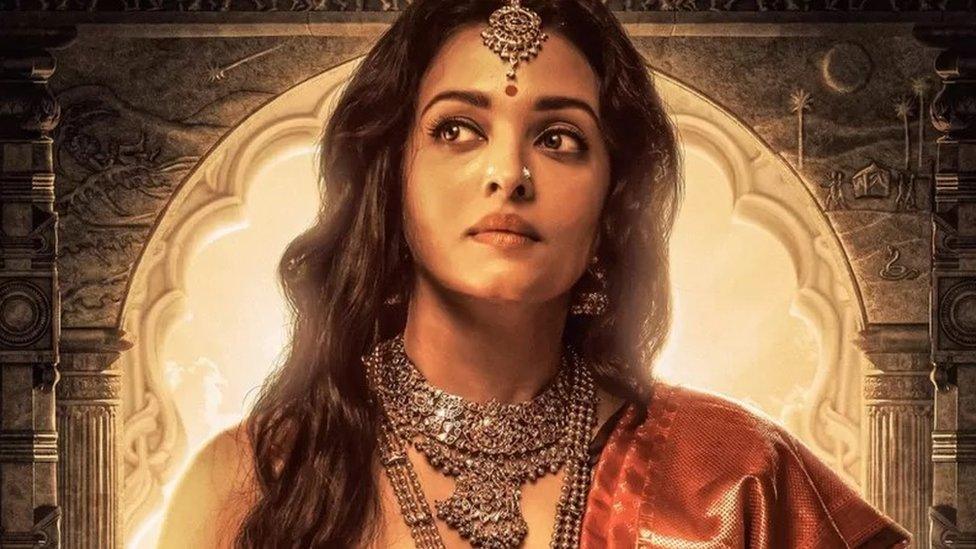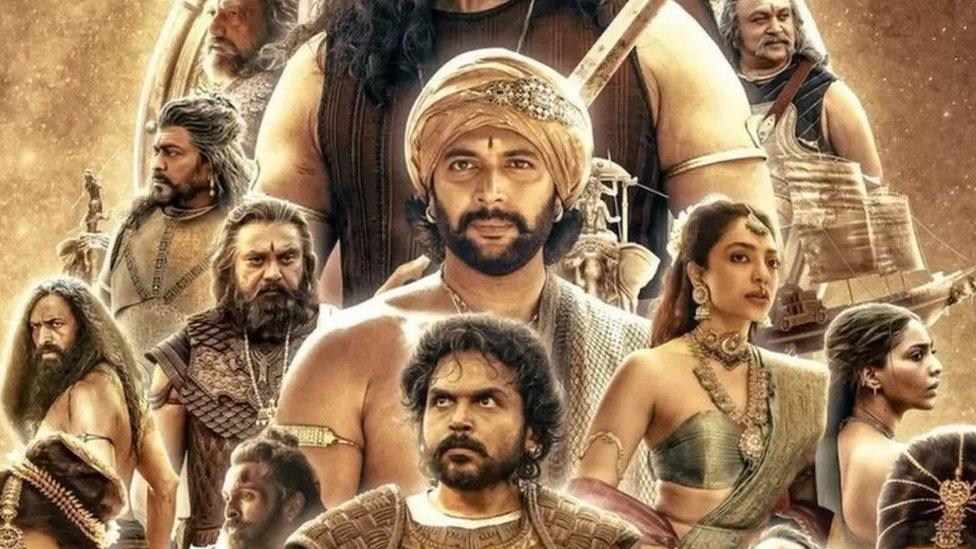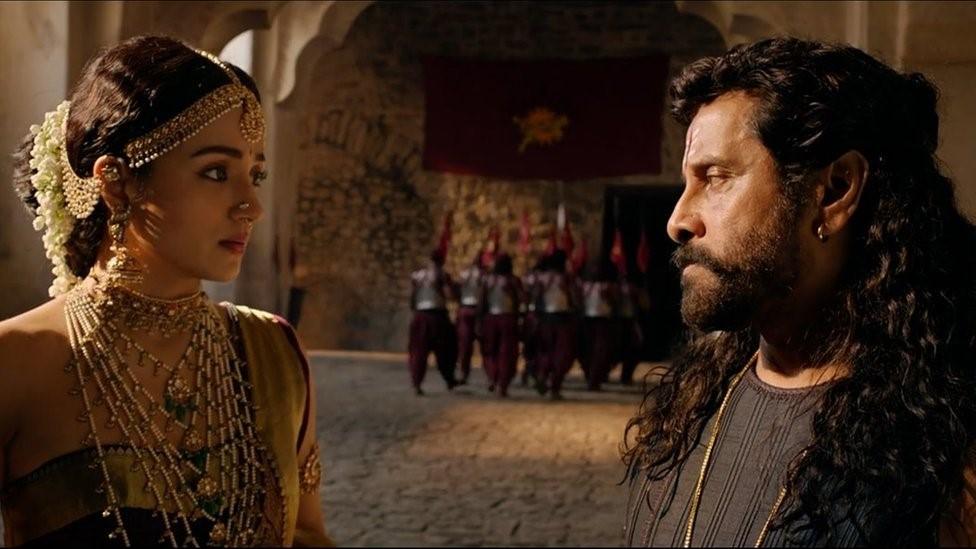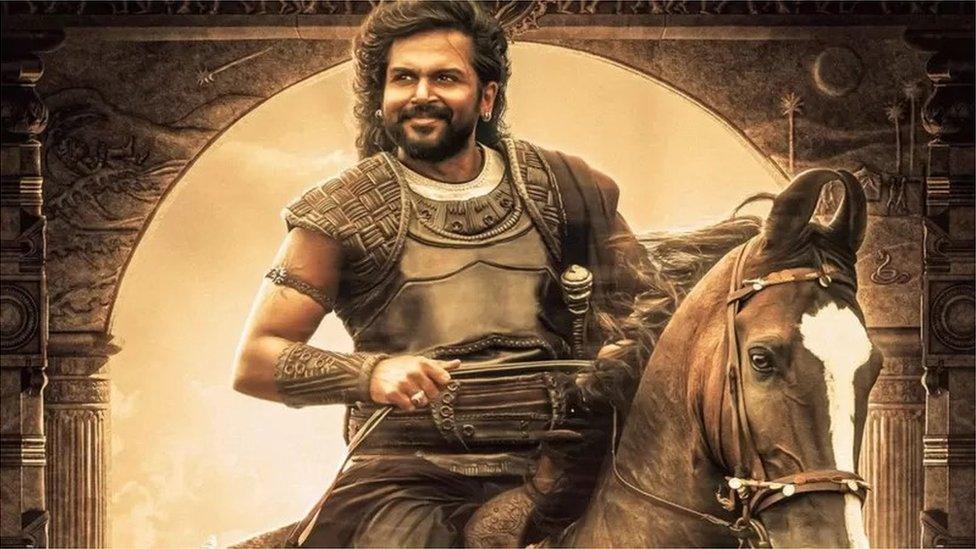Ponniyin Selvan: Mani Ratnam's epic drama fires up India box office
- Published

Aishwarya Rai Bachchan plays a noblewoman on a vengeful path to destroy her former lover
Celebrated Indian filmmaker Mani Ratnam's new film Ponniyin Selvan:1, a Tamil-language epic period drama, has taken the box office by storm. Sudha G Tilak on what makes the film a hit.
Ponniyin Selvan, based on one of India's greatest emperors, is widely considered by many to be the finest novel ever written in Tamil.
It was the name conferred by the loyal subjects on Rajaraja Chola - whose name means 'king of kings' - of the Chola dynasty, which ruled Tamil land from 9th Century to 13th Century.
Rajaraja was not the first of the Chola dynasty but he took their empire to its zenith - from a relatively small kingdom to the dominant empire in India. Their political influence extended across Sri Lanka, Maldives, Sumatra, parts of Thailand and Malaysia, and they had diplomatic ties with China.
Historian Sunil Khilnani wrote that Rajaraja "pulled off something that no Indian ruler before him seems to have done: he'd commandeered trading boats, timber sailed craft and launched maritime expeditions, bringing far flung wealth back home".
The star-studded film, which cost $70m (£62m) to make, revolves around Ponniyin Selvan's ascendency to the throne as his father, the ailing king, retreats from royal duties.

The film revolves around Ponniyin Selvan's ascendency to the throne as his father retreats from royal duties
The kingdom is embroiled in palace intrigues and an impending coup. Rival members of the royal clan plot to usurp the throne, and enemy kings conspire assassinations.
Leading the stratagem is a powerful and enigmatic noblewoman Nandini (played by Bollywood star Aishwarya Rai Bachchan) on a vengeful path to destroy her former lover and the prince-in-waiting (played by award-winning actor Vikram).
Her rival is princess Kundavai (played by leading Tamil actress Trisha) who wants to defeat the plots, protect her brothers, and see that her rightful sibling ascends the throne.
Actor Karthi plays the part of the colourful Vandiyathevan, a swashbuckling warrior and loyal friend of the princes. He is a musketeer-like figure, charming women, averting disasters, and thwarting plots with clever antics.
Ponniyin Selvan is a fictional literary record of the glory of the Cholas, whose cultural contribution remains visible in modern-day Tamil Nadu.
The king's imprint can be seen in the stunning sculptures and inscriptions in a towering granite temple in the city of Thanjavur, which was the seat of the Cholas.
The story of Ponniyin Selvan was serialised in Kalki, a Tamil magazine, by writer and journalist Kalki Krishnamurthy in 1955. The sprawling historical fiction, running to nearly 2,000 pages, has been published in several editions and translated into English.

The film boasts a galaxy of Tamil stars like Trisha (left) and Vikram (right)
Comic books for children based on the novel and theatre productions have kept the epic alive in popular imagination.
"The novel has a cult following across generations of Tamils. It will be interesting to see how a 21st-Century audience reared on Game of Thrones and homegrown fantasy movies like Baahubali responds to this film based on 10th Century dynastic Tamil politics, royal intrigue, and chicanery," says Chennai-based film scholar Pritam Chakravarthy.
Director Mani Ratnam, described as "India's top pop-film auteur", said in an interview that he wanted Ponniyin Selvan to be an "immersive experience" for the audience.
Scenes of bloody battles and warring soldiers, horseback and elephant chases and dances with actors in regalia captivate audiences. A beachfront invasion, the king battling the savage seas and the sinking of a ship are a nod to the maritime escapades of the Cholas. The dialogue is in medieval Tamil, but written to be accessible to a contemporary audience.
The film's music, a blend of Western chords, folk drum beats, monkey chants and Sufi strains is led by Oscar-winning composer AR Rahman.
Critics have appreciated Mani Ratnam for his deft adaptation of a five-part novel into two parts - the second part is due for release next year. Despite the pandemic, the director managed to wrap up filming both the parts of the movie, each running to nearly two-and-a-half hours, in 150 days.

Mani Ratnam wanted the film to be an 'immersive experience' for the audience
Ponniyin Selvan opened to a thunderous reception at the weekend.
Cinema halls in the southern city of Chennai saw people queue up for special shows that opened after midnight to accommodate the huge volume of ticket sales. Scenes of fans dancing to folk drumbeats outside cinema halls celebrating the release of the movie were seen across Tamil Nadu.
The frenzy over the film has spilled over with fans forming groups to travel across the former kingdoms and villages across Tamil Nadu ruled by the Cholas as mentioned in the novel.
The first part ends with a cliff-hanger. And fans say they are waiting with a bated breath for the second part next year.
Sudha G Tilak is an independent journalist and writer based in Delhi

Read more India stories from the BBC:
